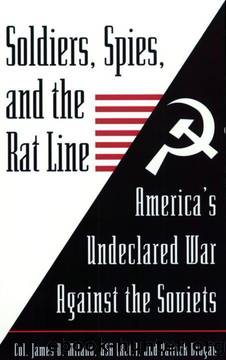Soldiers, Spies, and the Rat Line : America's Undeclared War Against the Soviets by James V. Milano;Patrick Brogan

Author:James V. Milano;Patrick Brogan
Language: eng
Format: epub
Published: 2012-02-05T06:33:00+00:00
In February 1948, Milano's office was warned that the Communists in Czechoslovakia were planning a coup against the government. The warning came from the French intelligence service, but through an unorthodox route, and-perhaps for that reason-it was ignored. The source was the exuberant and exotic Pete Chambers, who heard the news from a friend he had made in his Bohemian days in Paris before the war, when he was studying music in the hope of becoming an opera star. In Paris, he had acquired an American wife and many friends, one of them a lieutenant in the French army.
His time in Paris had been a crucial period in his life, quite apart from his brief marriage, and he cherished the memories. In the interval between his departure from France in 1938 and the German occupation in June 1940, he had continued to correspond with his French friend and with his ex-wife. When Paris was at last liberated four years later, in August 1944, Chambers had been with the U.S. Army in Italy. He had seized the first opportunity that offered to return to France to find out what had happened to them. His ex-wife had survived, with difficulty. Chambers had been able to help her in recovering her apartment. She had been turned out of it by supporters of the Vichy collaborationist regime, and, like many people all over liberated Europe, she needed some muscle to get it back. In France, that meant either the Resistance or the Americans: the legal procedure for evicting unwanted tenants would have taken years. Chambers solved the problem for her by arriving at the place with two or three large, well-armed GIs. The collabos left without arguing.
Chambers's friend, who was a lieutenant in the French Army, had escaped to North Africa when the Germans had occupied France and had joined the Free French, General Charles de Gaulle's resis tance movement. He had returned home in triumph with the general when the French Army had been given the honor of driving the Germans out of the capital. Chambers and he had a happy reunion. They were struck by a coincidence: both had become intelligence officers, Chambers in the U.S. Army, his friend in the Deuxieme Bureau of the French Army. After the war, when Chambers was stationed in Vienna, his friend came to visit him almost every month. The two officers were most discreet, but Chambers deduced immediately that the Frenchman was concerned with an intelligence network that his service was running in Czechoslovakia.
In theory, that country was still democratic. There was a coalition government in which the Communists were the dominant partners, but they did not rule uncontested, as their comrades in Poland and Hungary did. They were relentlessly pushing their strength in every corner of the administration, particularly the police and the armed forces. The French, like other Western governments, were in constant contact with the democratic ministers, who could see the noose tightening around their necks and were increasingly desperate at their situation.
Download
This site does not store any files on its server. We only index and link to content provided by other sites. Please contact the content providers to delete copyright contents if any and email us, we'll remove relevant links or contents immediately.
| Africa | Americas |
| Arctic & Antarctica | Asia |
| Australia & Oceania | Europe |
| Middle East | Russia |
| United States | World |
| Ancient Civilizations | Military |
| Historical Study & Educational Resources |
The Light of Days by Judy Batalion(829)
Stalin's War: A New History of World War II by Sean McMeekin(689)
Walk in My Combat Boots by James Patterson(615)
The Pacific War 1941-1943 by James Holland(612)
Victory's Price (Star Wars) by Alexander Freed(581)
The Vietnam War: An Intimate History by Geoffrey C. Ward & Ken Burns(570)
First Platoon: A Story of Modern War in the Age of Identity Dominance by Annie Jacobsen(566)
The American War in Afghanistan by Carter Malkasian(559)
Cold War (Alexander King Book 2) by Bradley Wright(558)
Operation Pedestal by Max Hastings(544)
Blood and Ruins: The Great Imperial War, 1931-1945 by Richard Overy(531)
The Madman Theory by Jim Sciutto(523)
Concepts of Space by Jammer Max;(520)
Extreme Fitness by Chris McNab(516)
World War II Infantry Fire Support Tactics by Gordon L. Rottman(504)
Flying Tiger by Samson Jack(503)
Pathfinders by AL-KHALILI JIM(498)
Panzerkrieg by Mike Syron(491)
Hitler’s Pre-Emptive War: The Battle for Norway, 1940 by Henrik O. Lunde(486)
